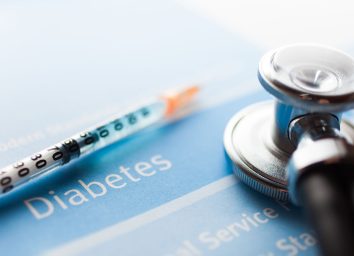Why It's OK to Have a Cheat Day, According to Registered Dietitians

Is there one day of the week where you just let yourself indulge in anything you're craving? Maybe your splurges consist of several slices of specialty pizza and a half of a pint of ice cream, or an entire pasta dish at Olive Garden along with a few breadsticks. No matter what food combinations you like to pull together on your day off from health-conscious eating, a recent study revealed that eating an excessive amount of calories every once and a while should not put you at risk of serious health issues, such as type 2 diabetes. So yes, having a cheat day isn't a bad thing!
The study called for a group of Australian men, all of whom were an average age of 22, to consume an additional 1,000 calories a day for either five days or 28 days. The short-term splurge mimicked what overeating may look like while on vacation or over the holidays, whereas the long-term splurge was supposed to emulate chronic overeating. In short, those who temporarily indulged experienced an increase in visceral fat that surrounds the organs, but did not undergo a significant increase in either weight or fat mass. Fasting levels of blood sugar didn't change either. However, those who overindulged for almost a month collectively witnessed an increase in total body fat, visceral fat, and post-meal blood sugar levels.
We asked registered dietitians Cynthia Sass and Maryann Walsh, MFN, RD, CDE, who is also a certified diabetes educator, to help unpack the findings of this study so that you can apply them to your everyday life. Or should we say…to your next cheat day?
Why doesn't short-term overeating significantly affect your overall health?
"What matters most to your overall health is what you do repeatedly, especially over time," says Sass. "While small deviations from a usual routine can have some short-term consequences, they don't tend to impact us long-term, because they're blips. One analogy I use with my clients is this: if you're on a financial budget and on occasion you go on a little shopping spree, you aren't going to rack up a huge debt. But if you have no budget and splurge more frequently, you can easily max out your credit card. It's all about the pattern."
Walsh concurs. "While you may see a sudden, temporary increase in weight as a result of overeating on short-term holidays or vacations, if you are someone who jumps right back into a normal routine, you should be able to shed the excess weight—depending on the amount, of course,—in a week or so," she says. "The idea of 'water weight' is somewhat true, as carbohydrates pull in water, so if we temporarily increase our carbohydrate intake from the usual (think pizza, pasta, fruity drinks) aside from additional calories, we will also pull in additional water. Again, upon resuming to our usual dietary habits, it usually sheds within a week or so."
Walsh says that the findings in the study suggest that our bodies demonstrate an elevated ability to manage blood glucose in response to eating too many carbohydrates in order to maintain insulin sensitivity. But again, the body can only keep blood sugar levels at a normal level for so long.
"Of course, prolonged overfeeding of carbohydrates that lasts weeks or months at a time is where we can decrease our insulin sensitivity, leading to conditions like diabetes."
Why may have researchers found an increase in visceral fat surrounding internal organs in those who only temporarily overindulged?
"Research has shown us that high intake of refined carbohydrates and saturated fats are linked to an increase in visceral fat, which appears more predominantly around the abdominal cavity and around the internal organs," says Walsh. Of course, the only difference here being that you can actually see belly fat, whereas the fat coating your internal organs is not visible.
"Considering in this study during the overfeeding period the calories were broken down into 55 percent carbohydrates, 30 percent fat, and 15 percent protein consisting of items like chips, chocolate, and meal replacement shakes, it can be seen that the refined carbs and saturated fat intake were likely high enough to solicit this increase in visceral fat," she says.
What is endogenous glucose, and why may have fasting levels increased in the short-term trial of this study? What does this tell us?
In the study, endogenous glucose is described as new glucose (or sugar) the body produces in addition to what it has already stored.
"The endogenous glucose likely increased in this short-term trial due to the overall increase in carbohydrate intake as carbohydrates turn into glucose," says Walsh. "This further demonstrates the fact that carbohydrate intake increases blood glucose levels."
How can overeating for a lengthy amount of time increase one's risk of diabetes?
"When one goes beyond short-term overeating and it becomes a regular occurrence to take in more calories than one physiologically needs, especially in the form of excess carbohydrates, this can lead to insulin resistance, as the body is unable to keep up with the consistent, excessive intake of carbohydrates," says Walsh.
Insulin resistance is what occurs when one develops type 2 diabetes. When the pancreas can no longer produce the amount of insulin necessary to manage blood glucose levels, that extra glucose begins to circulate in the body and wreak havoc on vital organs, including the heart, kidneys, and eyes.
Sass also points out that in the study, researchers found that participants who overindulged in calories for 28 days experienced an increase in total body fat, visceral fat, and post-meal blood sugar. All of these changes are associated with increased diabetes risk.
Why won't cheat days here and there impair glucose control or insulin levels?
"Cheat days here and there won't directly cause diabetes, as it can be seen from this study as well as others that the body has an ability to adapt to influxes of carbohydrates that cause an increase in circulating glucose," explains Walsh. "Most have the ability to produce more insulin to adapt to these influxes and handle this excess glucose so it doesn't become a problem."
How can I monitor my cheat days?
Even as a registered dietitian, Sass identifies that it's not realistic to eat balanced, healthful meals every single day.
"I do recommend, however, pre-planning the splurges. I have found that spontaneous splurges up the chances of overeating and may lead to eating things that aren't very satisfying," says Sass. "I advise using a scale from 0 to 5, with 0 being meh and 5 being can't live without. If something isn't at least a 4, you probably won't feel deprived passing it up. And if it is a 4 or 5, savor and enjoy it."








